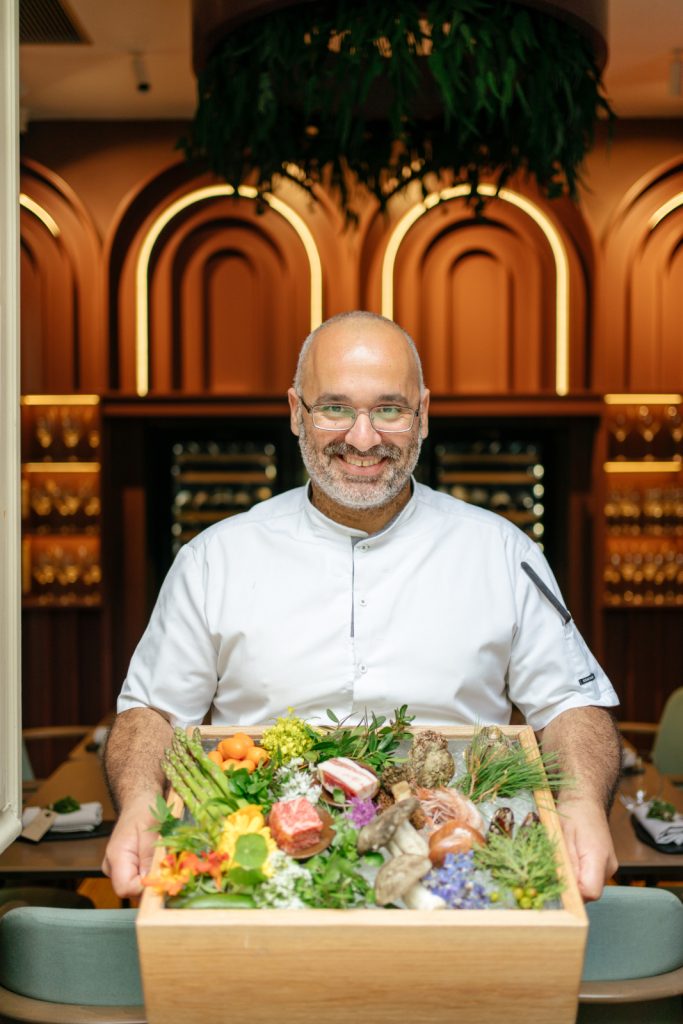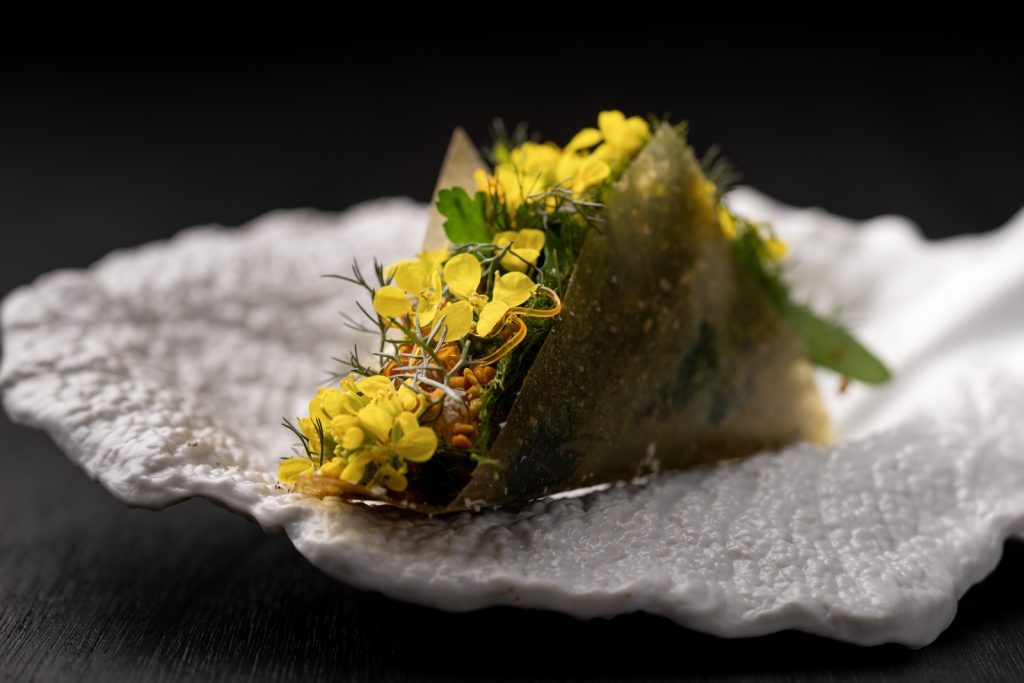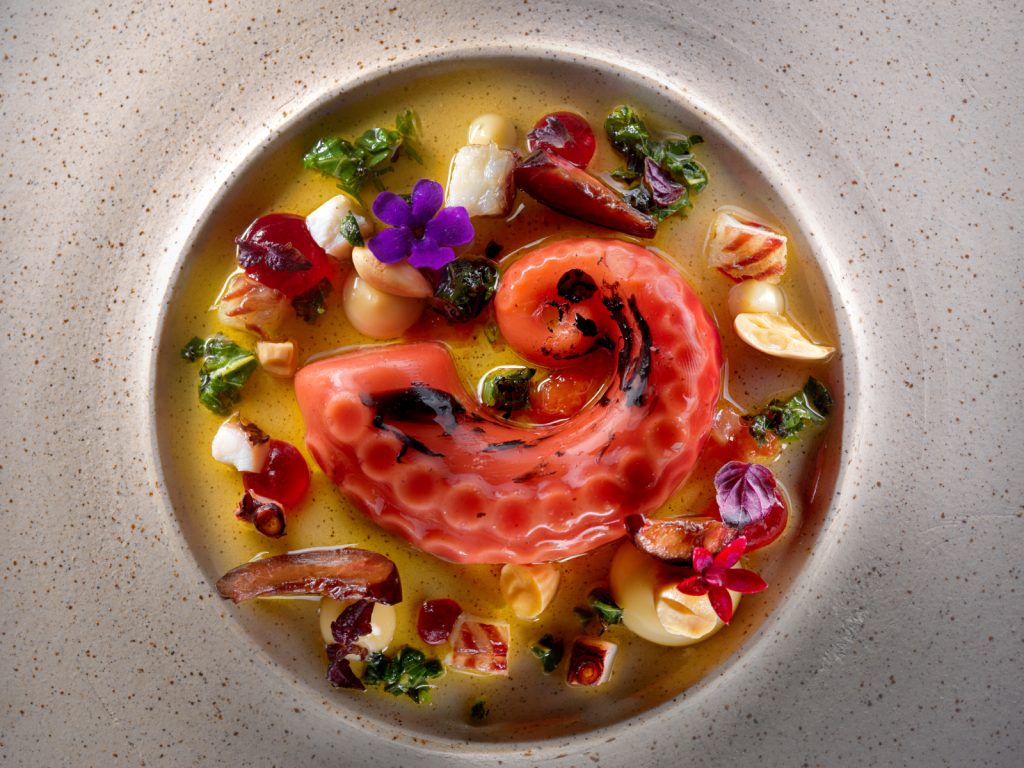In a world that’s rapidly changing and increasingly craving authenticity, sustainability is no longer a passing trend — it’s becoming a manifesto. The philosophy of zero waste is no longer just about recycling or ditching plastic straws. It’s now made its way into fine dining, turning into a quiet revolution that celebrates every last bite.
Across the globe, leading restaurants like Silo in London, Nolla in Helsinki, and Frea in Berlin are redefining fine dining with dishes rooted in seasonality, locality, and mindful responsibility. A lemon peel becomes a jelly; a beetroot root becomes a broth. In a zero-waste kitchen, nothing is discarded — everything is transformed with intent and creativity.
And Greece? It’s not lagging behind. Five renowned chefs from top Athenian restaurants share how the zero-waste philosophy translates into action — not as a lofty ideal but as a new culinary mindset.
From Philosophy to Practice: Cutting Down on Food Waste
The core of zero-waste cooking is minimizing food waste — with the environment being the first to benefit. “It’s alarming that around 37-40% of global carbon emissions come from food production. And a third of that food ends up in the trash — that’s roughly 12%,” says Alexandros Tsiotinis, chef and owner of CTC.
“We can’t avoid producing food — the population is growing. But we can reduce waste. That’s our responsibility as chefs,” he adds. But how exactly is this achieved behind the scenes?
Giving Every Ingredient More Than One Life
It all starts with the ingredients. In a zero-waste kitchen, every product is used to its fullest — from the amuse-bouche to dessert.
“We follow a nose-to-tail approach, which means using every cut of the animal, not just premium ones. You don’t butcher a cow just for the ribeye — we make great food using the leg, shoulder, back, even the ribs,” explains Tsiotinis. “We apply the same thinking to vegetables — root-to-leaf.”
Chef Anna Hochlaki of Yi, a fully plant-based restaurant, adds: “For example, we make crackers from leftover almonds and sweets from coconut remnants. We need large leaves for our wraps, but the smaller ones become salad or juice. Our food waste is barely more than that of a household.”
At Nyn Esti, based in the National Museum of Contemporary Art in Athens, chef Stamatis Misomikes trains his team to rethink what “waste” really is. “We have three bins in front of us at all times: plastic, paper, and food scraps. But what makes us proud is that we collect used coffee grounds from all our venues and turn them into our own version of soy sauce.”
At Soil, chef and co-owner Tasos Mantzis shares a similar philosophy: “Every ingredient is treated with respect and care. Nothing is ‘leftover’ in our kitchen. Zero waste isn’t something we added on — it’s the reason Soil exists.”
Chef Giorgos Papazacharias of the acclaimed Delta restaurant explains that this ethos starts during menu development: “We don’t just create dishes — we build a full 12-course experience with zero waste in mind. We use the main part of an ingredient in a savory dish and the trimmings in a dessert. For instance, our artichoke vinegar — made from pickled artichokes — is used to finish sauces or season fish.”
Seasonality, Locality & Fermentation: The Pillars of Sustainable Cuisine
Seasonality is at the heart of sustainable dining. “Our garden in Alepochori shapes our menus,” says Mantzis. “We observe what grows, when to harvest, and how it interacts with the climate. That’s how a dish like shrimp with marigold, orange, and mussel cream comes to life.”
Papazacharias echoes this: “Seasonality always leads our plates. I try to mimic nature — not other chefs abroad.” For Misomikes, menus are fluid and evolve with nature: “It’s a living dialogue between Earth and people.”
And as Tsiotinis points out, “If we’re serving summer-grown ingredients in January, we’ve manipulated the environment to make that possible. Something had to be sacrificed.”
Fermentation plays a crucial role in extending the life of ingredients. “We have a team dedicated to fermentation at Delta,” Papazacharias shares. “To minimize waste, we need preservation methods — pickling, brining, miso, garum. These techniques often finalize our recipes.” At Nyn Esti, one of the restaurant’s most popular dishes — cod — is fermented using last season’s tomatoes.
Sourcing locally is also essential, not just practically but ethically. “If we’re using limes from Brazil, they’ve had to travel — and that costs both financially and environmentally,” says Tsiotinis. “That’s why at CTC, we shop from small Greek producers.”
Delta took this one step further by sourcing several tons of artichokes from Argos during peak season — directly supporting local growers.
Many restaurants in Athens are now growing their own produce. “We’ve got a small greenhouse for our herbs and vegetables,” says Hochlaki. At Soil, Mantzis explains: “We cultivate everything naturally in our garden — with my father’s guidance and care.”
The Challenges of Going Green
Sustainability doesn’t come cheap. “The production and supply cycle is expensive. A quality tomato doesn’t cost one euro,” says Hochlaki. “And the effort behind it — from soil and water to the farmer — is immense.”
“It’s far cheaper to order Chinese garlic from the greengrocer than to search for local garlic from Kalamata,” agrees Tsiotinis.
Then there’s supply chain inconsistency and the need for continuous team training. “Nature doesn’t follow a strict schedule. Yields and prices vary,” says Mantzis. “You need flexibility, patience, and a team that shares your vision.”
Sustainability as Inspiration, Not Limitation
Some might think all these constraints could stifle creativity — especially in fine dining. But the opposite is true.
“Limitations create freedom,” says Misomikes. “When you’re working with only what nature offers at a given time, you discover truly creative solutions. Sustainability isn’t a barrier — it’s a spark for innovation.”
Papazacharias adds, “If you’ve got a story to tell, you’re not limited. Even if we reuse ingredients across several dishes, each plate that arrives at the table tells a different story. The presentation also plays a big role — each course has its own unique dishware.”
Guests Are Listening — and Learning
Ultimately, the most important judge is the guest. Are diners embracing this shift?
“The public is waking up. Some still only see the end result on the plate — and that’s okay. But I’m glad when they ask questions,” says Misomikes.
“At Yi, guests even ask to take home a single bite of salad,” notes Hochlakaki. “That either means it was an exceptional salad — or that they don’t want to waste anything. Either way, it’s a win.”
At Soil, guests are invited to experience the full cycle through the Alepochori Experience. They pick herbs themselves, learn about their seasonality, and witness how they’re transformed into the dishes they eat. “It brings them closer to the root of things — literally and figuratively,” says Mantzis.
A Return to Greek Roots
Greek cuisine is uniquely positioned for this sustainable future. With deep roots in seasonal, local, and agrarian traditions, zero-waste isn’t so much a revolution here — it’s a return home.
All that’s needed now is organization and vision.
According to Tsiotinis, Greek gastronomy is at a peak moment: “We’re lucky to have a generation of skilled, ambitious chefs who are drawing on international experience while reconnecting with Greek traditions. They’re creating a cuisine that speaks to the present — and dreams boldly about the future.”

















